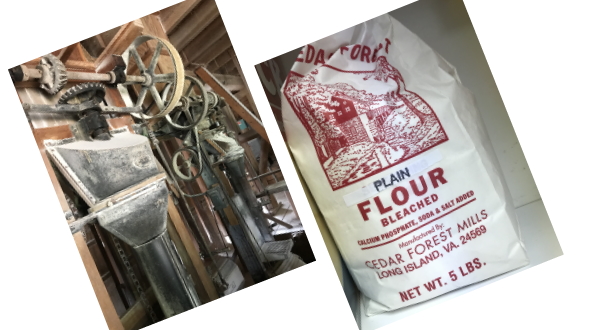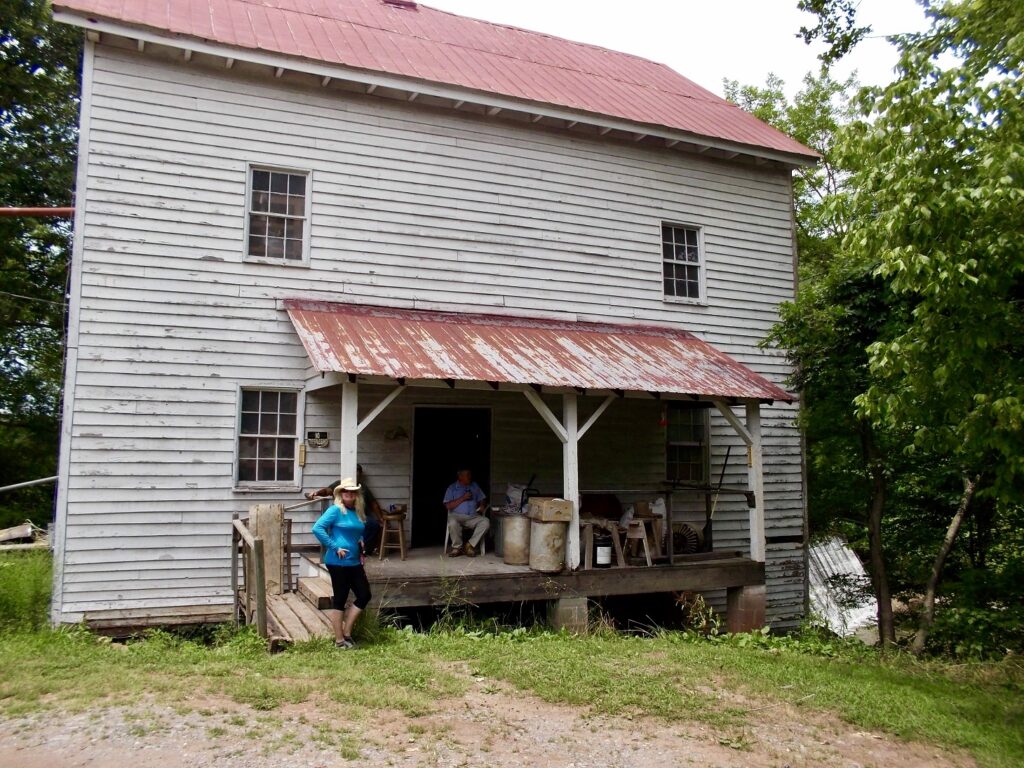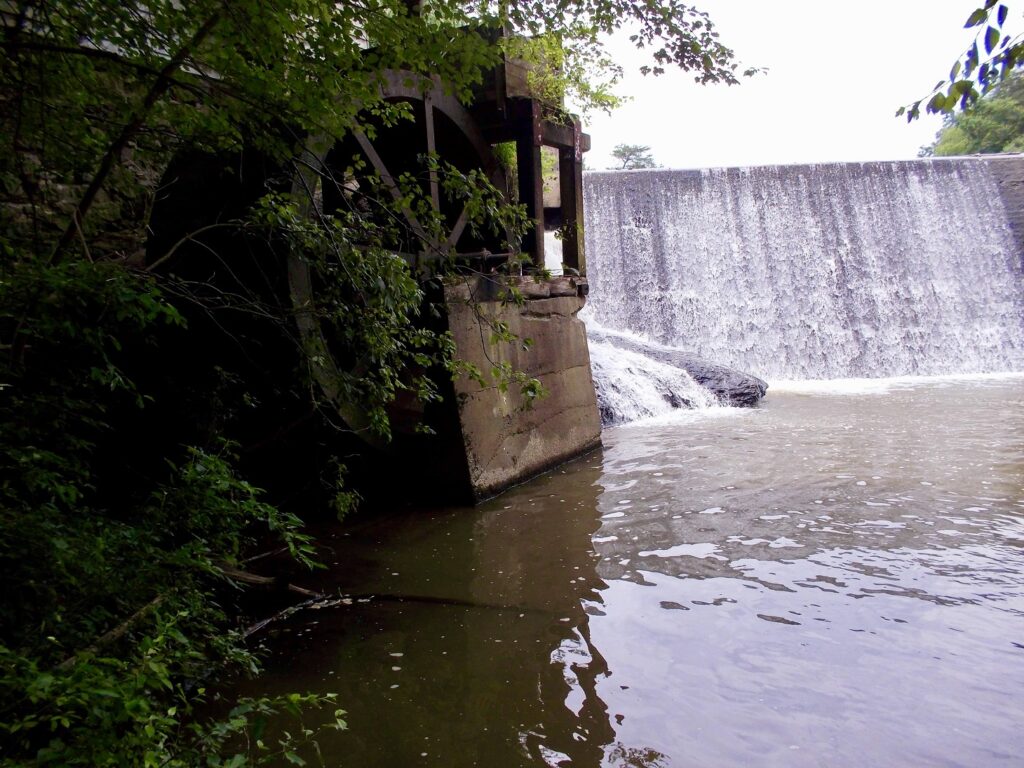
LONG ISLAND, VA- Eye catching millstones, powered by water wheels to mill grain and corn; big, circular saws at the community saw mill powered by diesel engines; community hog harvesting day, barn raising events. Were you lucky enough to be on the edge of time and able to experience these seemingly “old timey,” some say, “lost” ways?
Unless you live in Alaska and are a homesteader, these ways are probably not part of your current daily life. Perhaps you experienced some of it as a child in Southern Virginia in the 1970’s, as I did growing up in Oxford, N.C., not too far from South Hill, Va. It was a moment in time when transitions had rapidly occurred in our society and machines and factories sped up the processes that were previously done locally and by simpler, hands-on means.
Stopping by one of the oldest operating grist mills in Virginia, the Cedar Forest Mill in Long Island, can quickly take you back. I recently paddled the Staunton River researching for another Hyco Lake Magazine article, and hit the brakes hard when I saw the mill’s sign and historic building.
What Is Cedar Forest Mill?
It was not easy to miss because, as a paddler, I had already slowed down to check out Straightstone Creek to see if it was navigable (as any self-respecting paddler would do). The mill is situated in the corner of Pittsylvania County, almost in Chatham and the town of Halifax, right on Straightstone Creek.
Of course, the creek is the all-important water source for this 1880s-era mill that has served the community for 140 years.

A Passion for Milling
Ned Lunsford, the owner since 1975, remembers the mill from childhood and the lines of folks waiting their turn with their bags or loads of grain and corn. When he purchased the mill, his customers told him they remembered coming to the mill via horse or mule and wagon. He says they are all gone now.
His family owned the Lunsford Farm Supply in Brookneal for many years. The structure is still in downtown Brookneal — sign and all. This family business is where the fascination for milling flour and corn began for him. They would grind grain and corn into feed for farmers’ animals.
Lunsford remembers, as a young boy, mixing the feed with molasses for cows. He said it smelled “so good.” It is not surprising that he remembers that smell so strongly, so many years later, because the sense of smell is the strongest sense we have. In fact, according to www.discovermagazine.com, a 2014 study revealed that humans can actually distinguish at least 1 trillion odors.
‘Do Your Homework’
With the fascination for mills firmly ingrained, Lunsford begged his parents to take him to visit other mills, to the point where his mother finally told him, “No, you cannot go visit other mills every single Saturday, just every other Saturday and only after you do all your homework Friday night.”
Then something wonderful happened. When Lunsford was just seven years old, his parents allowed him to spend weekends with the family who owned Harper’s Mill out in the county, where he could learn and spend all the time he wanted in the mill. That mill is now the Historic Harper’s Mill Bed and Breakfast.
The passion as a young man became an all-out flame for the adult Lunsford. He approached the prior owner of Cedar Forest Mill, Mr. W.D. Sowell, who was not inclined to sell. Sowell saw that Lunsford meant to do what it took to get the mill online again, however, so he reluctantly agreed to sell it. That was in 1975 and by 1977, Lunsford had the mill back up and running.

Getting Cedar Forest Mill Operational
At first, he used water from Straightstone Creek to power the vertical, overshot style waterwheel. The creek was not able to keep up with demand, however and in the 1990s, during long droughts, Lunsford made the decision to change over to electricity.
The wheel still resides in place over the creek, on its own separate platform. Most water wheels were built separate from the actual Cedar Forest Mill building to avoid vibrating the building as they turned.
Straightstone Road and Creek
Have you wondered about the intriguing name of Straightstone Road and Creek where the mill is located? I had to ask Lunsford about it. He told me he and his brother paddled the Staunton River when he was 17. They canoed up the creek, and at the mouth of the creek where the river flows by, there is a ledge of angled “straight stones” and he believes that is where the name came from.
Of course, I must go paddle this section, so I asked another local, Dennis with Renegade River Runners, and he also knew about this creek that feeds into the Staunton River. He even sent me a photo of an old map that clearly says, “straight stones,” near the mouth of the creek. When one hears a unique road name or creek name, it’s worth asking about. I still want to know about the origin of the name, Calfkiller River, but that’s another story, I guess (and another paddling trip). Sometimes there just isn’t enough time to investigate all the wonders that still exist in our world.
When folks say, “I’m bored,” I just don’t get it. You’re not doing something right if you are bored consistently. Get outdoors and go explore! Meet new and interesting people and places, like Ned Lunsford and Cedar Forest Mill.

Bygone Process
How is it that this bygone process of milling wheat and corn from the 1880s still exists and, even more amazingly, is still in production? Why do some people still prefer stone ground flour and corn? According to www.washingtonpost.com, “small mills leave in the bran and wheat germ, which makes them nutritionally superior, with no preservatives.” Stone ground is preferred by many bakers and cooks because they believe it has a better texture and flavor.
Lunsford sells flour to at least two local restaurants. Perhaps you’ve enjoyed the biscuits at Burgers, Shakes and Cream in Brookneal or fried chicken (using the owner’s secret blend) from Kenney’s in Lynchburg. Lunsford has sampled both and says they are delicious. I will stop in when I go to paddle Straightstone Creek.
I bought a bag of all-purpose flour from Lunsford the day I hit the brakes and stopped to talk and tour the mill. Those biscuits were some kind of light and fluffy. I called them Covid biscuits because I had not slowed down and taken the time to cook biscuits for my family in many years, but after getting that fresh flour from Lunsford, I was inspired. Of course one batch was not enough! Just yesterday I made fried green tomatoes with his flour and they were great.
Some Interesting Customers
Cooks aren’t the only interesting customers of Cedar Forest Mill. Lunsford remembers a previous owner who came to visit the mill on his 100th birthday. Lunsford said one customer came with a lot of grain who wanted to pick it up in the middle of the night. He says he was pretty sure this customer was making black pot moonshine. (I had not heard of this technique. We learn something new every day.)
Black pot makes more but is not as pure, Lunsford said the super nice guy did get busted. Nothing like outlaw apple pie moonshine. It’s just not the same as that sold in a store. I’m not saying I have ever had any mind you…. just from what I’ve heard…ahem.

Cedar Forest Mill’s Future
When I asked Lunsford what the future looks like for Cedar Forest, he said he’s not sure. Since the mill has not been designated as an official historic site. The Virginia is for Lovers website does call it a “historic site” and lists his mill, but it is not official, therefore the mill is not able to obtain any type of historical grants or assistance for costly upkeep and maintenance on the 1800s-era building and machinery.
Lunsford says it’s a lot to manage. Perhaps the Pittsylvania Historical Society or a similar organization can help keep this treasure alive and well for this community.
Are you a farmer with extra wheat? Lunsford can take it cleaned or uncleaned — the price is the same either way. Are you a chef at a local restaurant and want to feature local goods? Give Lunsford a call. He can custom grind if you prefer.
Cedar Forest Mill
7929 Straightstone Road
Long Island, Va. 24569
(434) 335-5136
















